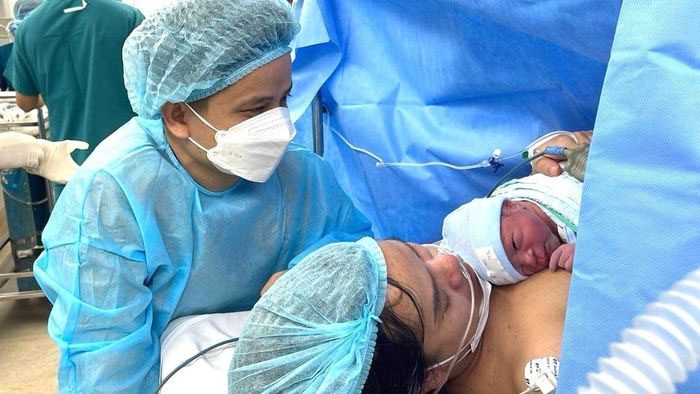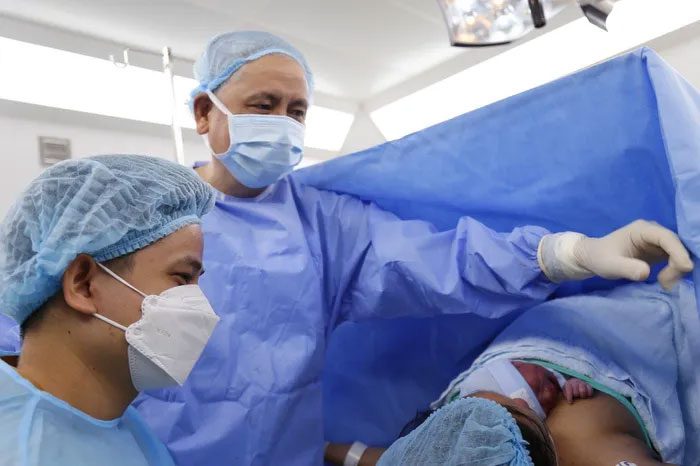A baby boy who underwent major surgery while still in the womb due to a congenital heart defect has been born, weighing 2.9 kg and crying loudly. This child is the first case of fetal cardiac intervention in Vietnam.
A Remarkable Case, Beyond Expectations
At 9:17 AM on January 30, the special baby was delivered via cesarean section, crying loudly to the emotional response of the medical team. This is the first baby born from a fetal cardiac intervention in both Vietnam and Southeast Asia.
Dr. Nguyen Thi Thanh Huong, Deputy Director of Children’s Hospital 1 in Ho Chi Minh City, stated that the surgery lasted 25 minutes. Immediately after birth, the resuscitation team from Tu Du Hospital and the Neonatal Department of Children’s Hospital 1 evaluated the infant’s condition. Fortunately, the baby’s SpO2 level reached 89%, and the child was breathing room air.
“I have never felt such emotions in the operating room. This is a very remarkable case, exceeding the team’s expectations. The baby cried very loudly upon birth,” Dr. Huong said.

The 2.9 kg baby boy is born amidst the joy of family and medical staff. (Photo: TS).
In fact, doctors anticipated that the child might need oxygen immediately after birth. If this case had not been addressed prenatally, the baby would have required stenting or ballooning of the pulmonary artery right after birth. Direct echocardiography performed in the operating room showed that blood flow through the narrowed pulmonary artery was very good, with moderate stenosis. This means that the baby does not require any interventions in the early stages of life.
After birth, the infant will be transferred to the Neonatal Intensive Care Unit at Children’s Hospital 1 for ongoing monitoring and evaluation. The next day, specialists will reassess the situation and develop a long-term treatment plan for the baby.
Dr. Tran Ngoc Hai, Director of Tu Du Hospital, was the lead surgeon in the operation. He mentioned that after the umbilical cord was cut and the baby was handed to the resuscitation team, the infant was breathing room air like a normal child. The baby underwent skin-to-skin contact with the mother. The pregnancy reached 37 weeks and 4 days.
“The doctors were deeply moved. Cases of children without a pulmonary valve are usually very serious, and the prognosis is very poor, but today the baby was born very well. The condition of the newborn will change every hour, and we will closely monitor it,” Dr. Hai stated.

The baby boy was born at 37 weeks and 4 days in the mother’s womb. (Photo: BVCC).

The Director of Tu Du Hospital is the lead surgeon. (Photo: BVCC).
The Mother’s Determination Motivates the Medical Team
“I was very moved to see the mother on the operating table, tears streaming down her face. This is the result of the mother’s courage; her determination was the motivation for the entire team because this is the first case in Vietnam. Although we prepared everything to ensure safety, the family’s and mother’s determination was the driving force for the entire team,” Dr. Huong shared.
Previously, on January 4, doctors in Ho Chi Minh City successfully performed the first fetal cardiac intervention for a 32-week-old fetus with severe congenital heart defects. This is the first fetal cardiac intervention in both Vietnam and Southeast Asia. After many years of planning and careful preparation, the dream of Vietnamese doctors to save children with congenital heart defects from within the womb has become a reality.
According to experts, the technique of fetal cardiac intervention has only developed in the last five years. Worldwide, only a few places such as Brazil and Poland have successfully performed it.

The first fetal cardiac intervention in Vietnam and Southeast Asia. (Photo: BVCC).
This special case involved a 28-year-old pregnant woman from Da Nang. When severe heart abnormalities were detected in the fetus, she was transferred to Ho Chi Minh City for monitoring. At Tu Du Hospital, when the fetus was 26 weeks old, the time for doctors to decide on fetal intervention was a critical moment, going through three rounds of consultations.
When the fetus reached 32 weeks and 5 days, the baby’s life was in danger, prompting Tu Du Hospital to hold an emergency consultation with Children’s Hospital 1. Specialists assessed that without immediate fetal intervention to balloon the pulmonary valve, the fetus could die in the womb. If delivered immediately, the fetus could face death right after birth.
According to the Director of Tu Du Hospital, intervention in the womb is an urgent solution to save the fetus still inside the mother. When intervention is performed from the womb, the success rate is higher than when the child has been born, as the fetus has a remarkable mechanism of self-healing and repair. This mechanism, formed from stem cells, will self-correct, heal itself, leaving no scar.
Both major specialized hospitals in Ho Chi Minh City plan to establish teams of anesthesiologists for adults, fetal interventions, cardiac ballooning, and neonatal resuscitation if surgery is needed, as well as obstetric teams to prepare for cesarean delivery in case of emergencies.
At 8 AM on January 4, the doctors reviewed all plans once again. At 9:05 AM, the team proceeded with the fetal cardiac intervention. The doctor used an 18G needle to penetrate through the abdominal wall, into the uterine wall, into the amniotic cavity, piercing the chest of the fetus directly into the heart chamber, reaching the right ventricle, finding the exact position to open the heart valve for the fetus.
The intervention lasted nearly 40 minutes. Subsequent ultrasound results showed good flow through the pulmonary valve of the fetus, with no pericardial effusion. All efforts and preparations were rewarded, ensuring the safety of both the fetus and the mother. On the morning of January 8, the mother was discharged from the hospital.


















































